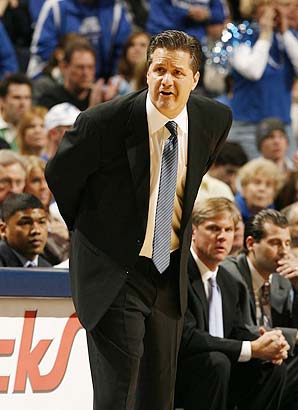
Calipari not implicated in another scandal, but he's far from clean
Louisville's program has seen better days, and it's doubly painful for Cardinals fans to see Kentucky, with John Calipari and his army of blue-chip freshmen, poised to assume supremacy in the Bluegrass State. Meanwhile, many a Wildcats fan is reveling in the fact that their revival coincides with the disgracing of Pitino, who bailed on UK for the NBA in 1997, then had the audacity to take the reins of their bitter rival in 2001.
If the Wildcats do return to glory under Calipari, though, no one will consider it a virtuous achievement. Not after Thursday's report that Memphis, Calipari's old school, will be forced to vacate its NCAA-record 38 wins and national title game appearance from '07-08 due to the fact that star point guard Derrick Rose became eligible only after a former high school teammate fraudulently took Rose's SAT. While the ruling doesn't directly implicate Calipari, it's an indictment against the way he runs programs: He's now the only coach in history to have Final Fours vacated at two different schools. (UMass, where Marcus Camby was deemed ineligible for taking $28,000 as well as jewelry and prostitutes from agents in '96, was the first.)
Kentucky, whether or not its fans are willing to acknowledge it while frothing over the potential of Calipari's '09-10 team, has cast its lot with a man with college basketball's most tainted resumes, and made him rich in the process. The extent of Louisville's stain has already been defined, as the worst tabloid fodder from Pitino's sex scandal and extortion case has spilled out, whereas one has to wonder where UK's image problems will begin or end.
Perhaps it'll be limited to a cloud of suspicion over any of Calipari's success. Will future Final Four trips be considered legit, when he's already had two of them wiped off the books? And if he does, say, win the school's eighth national title, will its fans celebrate the raising of that banner, while simultaneously worrying about the possibility of it coming down?
Calipari can still go into recruits' living rooms and say that he's never been implicated in an NCAA scandal, and that he can get them to the Final Four. But teams recruiting against him will be happy to point out that while you might get to a Final Four with Cal, there's a good chance it won't count -- and if trouble starts brewing on campus, don't expect him to stick around. He'll have jumped ship for safer (and usually more lucrative) places long before the sanctions drop. By the time UMass was hit, Calipari had already left to take over the New Jersey Nets, and by the time Memphis was hit, Calipari was already in Lexington. When the NCAA held a hearing on the Rose affair in Indianapolis, Calipari didn't even attend -- he phoned in from China.
There will be debates over whether what happened with Rose was Calipari's fault, or the NCAA's fault for initially clearing Rose to play, or the Memphis' athletic department's fault for lack of oversight. Kentucky's line will likely be to reiterate that Cal has never been fingered by the NCAA; as governor Steve Beshear said on Thursday during a state fair appearance with Calipari, "I'm not worried about it because they have never said Coach Cal did anything wrong."
Calipari didn't arrange Rose's SAT scam, in the same way he didn't arrange agent payments to Camby, but in both cases it's hard to fathom that Calipari was 100 percent ignorant of what was going down. He had far too much at stake in Rose and Camby to not be intimately aware of what was going on in their lives. Even if you're convinced that Cal is a victim -- that it was only a coincidence that two major scandals happened on his watch -- you can't deny that he profited immensely from his illicit use of those two stars.
Where would Calipari be had Camby not played for UMass in '96? Calipari was already establishing himself as a good, young coach there; he'd taken the Minutemen to back-to-back NCAA tournaments before Camby's arrival in '93. But it's unlikely Calipari would've reached a Final Four without the services of the nation's preeminent big man. And without those credentials, there's no chance he's offered a five-year, $15 million contract by the Nets to become their coach and vice president of basketball operations later in '96.
Where would Calipari be had Rose never played for Memphis? Calipari had already been turning the Tigers into a force; he'd won C-USA titles and gone to the Elite Eight in each of the two seasons before Rose arrived. But Rose was the transcendent talent that put Memphis over the top, to within a few missed free throws of a national championship. Without that 38-2 season and near-national title, there's little chance Calipari is offered an eight-year, $31.65 million deal by Kentucky two years later. When the Wildcats were looking for a new coach in '07 (eventually hiring Texas A&M's Billy Gillispie), Calipari hadn't even been granted an interview.
When Pitino was allowed to keep his job last week -- despite a morality clause in his contract that seemingly would have allowed Louisville to fire him without a buyout -- it wasn't a great day for the public image of college basketball. A message went out to present and future coaches: If you build up enough capital by winning games, your employer will be willing to overlook even the sleaziest of personal scandals. As the NCAA prepares to erase another Calipari milestone, another message is being sent: You can have not one, but two Final Fours vacated for using ineligible players, and still become the highest-paid coach in the game, at the most storied basketball school in the land. Knowing that, what incentive is left to stay clean?




